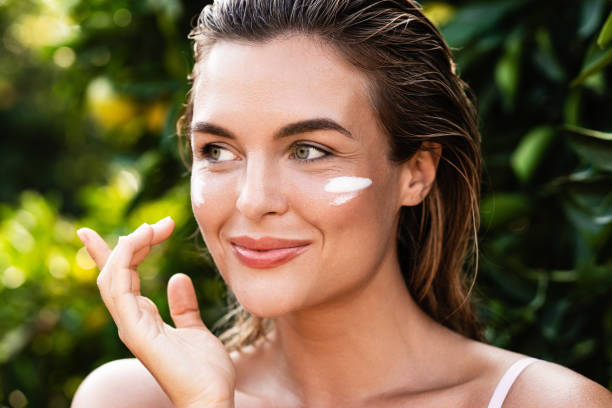1. Introduction
Using Sunscreen For Skin is a good part of a skin care routine, but doesn’t understand its benefits and Sahib Stimal’s Tariq. Sunscreen is essential to prevent skin damage from sun exposure. UV rays, emitted from the sun, damage the skin’s elasticity, causing wrinkles and premature aging.
Apart from this, UV rays are also a risk of skin cancer. Sunscreen, which comes with SPF (Sun Protection Factor), protects the skin from harmful rays and keeps your skin healthy and youthful.
2. Importance of Sunscreen For Skin

SPF, or Sun Protection Factor, measures the effectiveness of sunscreen. The more SPF you win, the more protection you get. SPF 15, 30, and 50 are commonly available in the market. SPF 15 protects your skin from 93% of UVB rays, while SPF 30 provides 97% and SPF 50 provides 98% protection. It is important to choose an SPF based on your skin type and exposure. If you are involved in outdoor activities, use a sunscreen with high SPF.
3. Purpose of Broad Spectrum Sunscreen
Broad-spectrum sunscreen is a sunscreen that protects the skin from both UVB and UVA rays. UVB rays cause short-term damage, while UVA rays affect the deeper layers of the skin and accelerate the aging process. Therefore, it is important to prescribe a broad-spectrum sunscreen that provides protection from both types of rays. It helps in protecting your skin more effectively and protects your skin from premature aging.
4. Type of Sunscreen: Chemical Vs. physical
Sunscreens come in two main types: chemical and physical. Chemical sunscreens, such as avobenzone and octocrylene, are absorbed through the skin and neutralize UV rays. Physical sunscreens, with zinc oxide and titanium dioxide, reflect UV rays by forming a protective layer on the skin. If you have sensitive skin, physical sunscreens are ideal because they are gentle and anti-irritant. Chemical sunscreens are also effective, but they must be reapplied regularly.
5. Sunscreen according to skin type

Your skin type plays a big role in choosing a sunscreen. If you have oily skin, choose a gel-based or oil-free sunscreen that won’t leave your skin greasy. Those with dry skin can use a log cream-based sunscreen that also moisturizes their skin.
For combination skin, a lightweight sunscreen that is non-comedogenic is suitable. Those with sensitive skin should choose hypoallergenic and fragrance-free sunscreens that reduce the risk of irritation.
6. Sunscreen and makeup combination
People are often confused about whether to apply sunscreen with makeup. Your makeup doesn’t work as well as sunscreen if you apply sunscreen first and then apply makeup. Apply sunscreen as a base layer followed by foundation and other makeup products. This way your skin will get proper protection and your makeup will also look flawless. Reapplying sunscreen is also important, especially if you go through the spring.
7. Re-application of sunscreen
Reapplying Sunscreen For Skin is also a must, especially if you’re swimming or doing sweaty activities. Sunscreen should be reapplied every 2 hours, or whenever you have stopped rubbing off the sunscreen. Water-resistant sunscreens may also be used, but these should also be reapplied. Regular application of sunscreen protects the skin from UV rays at all times and protects your skin from sun damage.
8. Sunscreen and sun protection measures

Along with sunscreen, you should also take other sun protection measures. You can provide additional protection to your skin by wearing a wide-brimmed hat, sunglasses, and protective clothing. Staying in the shade and not going out during the sun’s peak hours (10pm to 4pm) also help prevent sun damage to your skin. This combination increases the effectiveness of your sunscreen and maintains overall skin health.
9. Expiration date of sunscreen
Sunscreen also has an expiration date, and it’s important to check the expiration date. Expired sunscreen wears off and does not protect your skin properly. Generally, sunscreen has a shelf life of 2-3 years, but the exact duration is mentioned on the product packaging. Avoid using expired sunscreen and always use fresh sunscreen to protect your skin as much as possible.
10. Choosing and purchasing sunscreen
Also check the ingredient list when choosing a Sunscreen For Skin. You should choose products that are free of harmful chemicals and contain skin-friendly ingredients such as vitamin E and antioxidants. There are different types of sunscreen available in the market, you should choose the one according to your skin type and requirement.
Reviews and dermatologist recommendations can also help you choose the right product. Choosing the right sunscreen keeps your skin healthy and protected.
Through this article, you have got comprehensive information on the right choice and use of sunscreen. These tips and guidelines will help you protect and improve the health of your skin.

[…] δέρμα μπορεί να αισθάνεται σφιχτό και ξεφλουδισμένο. Καταλαβαίνω δέρμα Οι αστραφτεροί πόροι είναι σημάδι λείανσης του […]